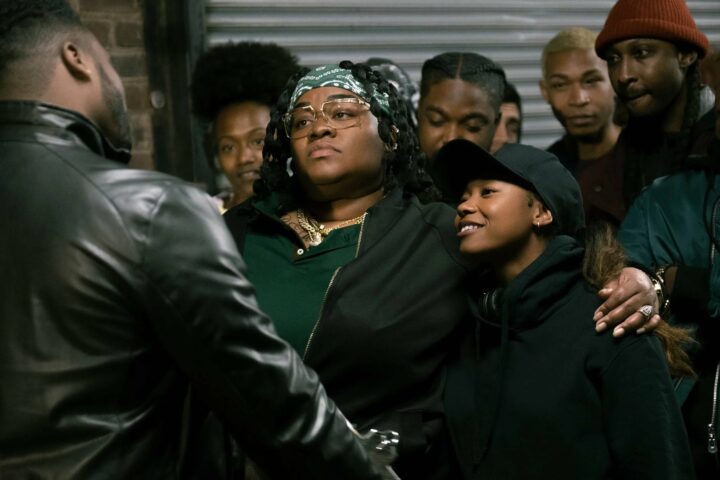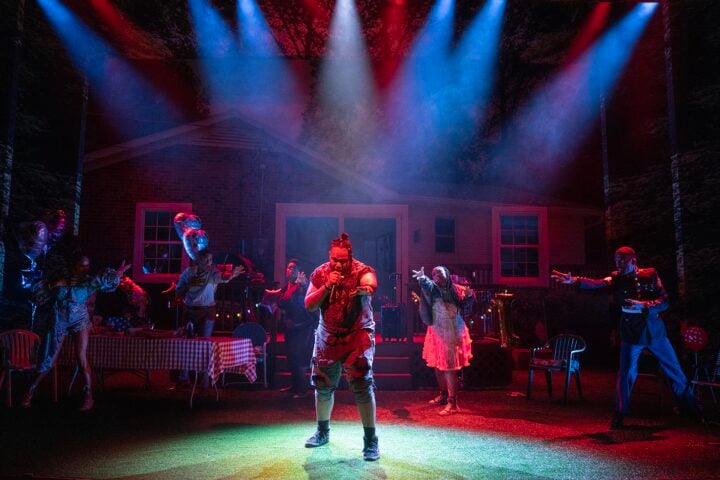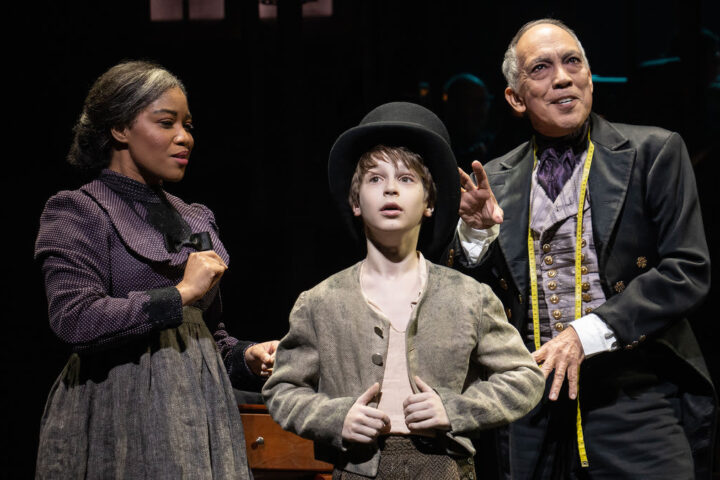As the criminal barristers in London’s Crown Court know, according to star-on-the-rise Tessa Ensler (Jodie Comer), any prosecutor or defense attorney could come out on top depending on the day and case at hand. “We don’t call it losing,” Tessa, herself a defender who usually fighting for men accused of sexual assault, explains. “We call it ‘coming second.’”
But as awards season fast approaches next month, an unchallenged series of wins may be all but assured for Comer, the star of TV’s Killing Eve who won an Olivier Award earlier this month for her performance (her first stage role) as Tessa in the West End production of the one-woman show Prima Facie. The production, whose title is a Latin legal term that means “on the face of it,” referring to the first impression of a case, also won the Olivier for best play, and Comer finds in Australian playwright Suzie Miller an author worthy of her talent.
Comer endowed Killing Eve’s Villanelle with a sort of kaleidoscopic recklessness, creating a character consistently aroused and electrified by her own unpredictability. And while Tessa, who clings to the rigidity and certainty of the law, shares little in common with Villanelle (at least on the face of it, so to speak), Comer undergirds her performance with the same sort of fearlessness that’s both physical—Tessa leaps on to tables, bursts into un-self-conscious dances, gets soaked in ample on-stage rain—and emotional. Miller doesn’t give Comer a simple arc to play: Tessa communicates her story through a peripatetic present-tense narration that’s filled with flashbacks and pivots that require the sort of minute performance detail at which Comer excels.
Though there’s only one actor on stage, Comer and director Justin Martin cleverly construct stage pictures that make other characters come into focus. As Comer verbally dissects a victim in a sexual assault trial on the stand, you can almost see the woman in the empty chair she addresses. Killing Eve viewers will be familiar with Comer’s masterful accent work, and that’s on display here as Tessa occasionally takes on the voices of other characters in telling her story.
The significance of some of those accents may be lost on some New York audiences: Tessa is from a lower-class family in Liverpool (Comer’s native accent is Scouse—from Liverpool—too), but, among her colleagues, she puts on a posher English accent as performative as the mocking walk she demonstrates when conjuring up images of her upper-crust law school classmates.
Early on in Prima Facie, Tessa admits, “I’m still pretending,” referencing her serious case of imposter syndrome, but there’s nothing fake about Tessa’s love for “the game of law,” as she calls it. “A good lawyer just tells the best version of their client’s story,” Tessa insists, her “dinner party” answer that intentionally absolves her of ethical responsibility for meting out justice.
Tessa sees herself as a very specific cog in an engine that will only function if she plays her role without thinking—or feeling—much about morality either way. Miller’s rapid-fire text keeps Comer moving at a verbal velocity that both communicates Tessa’s brilliance and suggests that perpetual motion is her coping mechanism: She can’t give herself time to dwell too deeply on the experiences of the women in these assault cases, especially not in a world that’s already dominated by male lawyers and judges and juries to whom she must constantly prove herself.
But Prima Facie takes a dark turn that forces Tessa to confront her objective distance, her culpability as an attorney in essentially putting women on trial for crimes committed against them, and the viability of the law itself. And what happens to Tessa occurs within the context of an interaction that’s been consensual up until the moment that it’s not: Miller places Tessa in the very sort of agonizing circumstances that a shrewd defense attorney would pick apart, leaning into a he-said, she-said debate built to confound a jury.
As Tessa travels further and further from the security of the system in which she once sought comfort as an attorney, there’s a particularly potent shift. When Tessa takes the stand herself, we suddenly only hear her answers and not the questions that the defense attorney is firing at her. In this moment, she’s temporarily lost the power to be the narrator who tells her story on her own terms, a reminder of the inherent silencing of survivors even as they give testimony.
It’s pretty clear early on what the lessons of Prima Facie will be, and from the moment we learn that Tessa regularly defends sexual assailants, Miller primes us to condemn Tessa’s detached destruction of the women she so coolly cross-examines. Tessa’s reevaluation of the usefulness of the law, and her place in its unfeeling machinery, gets compellingly complex as she struggles to separate Tessa the defense attorney from Tessa the plaintiff. She’s trained herself so rigorously to poke holes in women’s stories, to expose what’s unknown or unremembered, that she finds herself treating her own testimony with the same supposed impartiality.
That Tessa will eventually shatter her own self-doubting thought patterns seems inevitable. But it’s to the detriment of Miller’s otherwise taut storytelling that the character’s transformation finds fruition in a speech that, while grounded in the story, spells out the play’s purpose and call to action without the copious subtlety of everything that’s come before. It seems important that Tessa express these realizations in her commanding attorney’s voice, but a particularly blunt lighting choice makes the climactic speech too much about us and not enough about her.
If the play’s teachings get hammered home a bit redundantly in those final minutes, though, that hardly undercuts the harrowing journey that Prima Facie takes the audience on to arrive there. Martin’s production ably creates the high-tension world through Ben and Max Ringham’s sound design intensifying Rebecca Lucy Taylor’s choral and percussive score, Natasha Chivers’s intimidating flashes of light, and stage designer Miriam Buether’s untouchably towering walls of legal files. But it’s Comer’s Tessa, tough and raw, blisteringly believable as she begs to be believed, who wins the case for this play as urgent, necessary theater.
Prima Facie is now running at the John Golden Theatre.
Since 2001, we've brought you uncompromising, candid takes on the world of film, music, television, video games, theater, and more. Independently owned and operated publications like Slant have been hit hard in recent years, but we’re committed to keeping our content free and accessible—meaning no paywalls or fees.
If you like what we do, please consider subscribing to our Patreon or making a donation.





